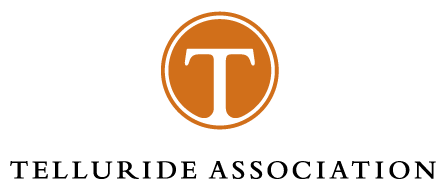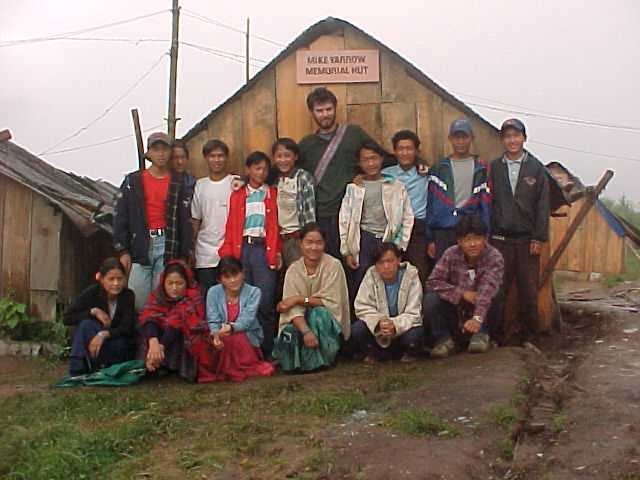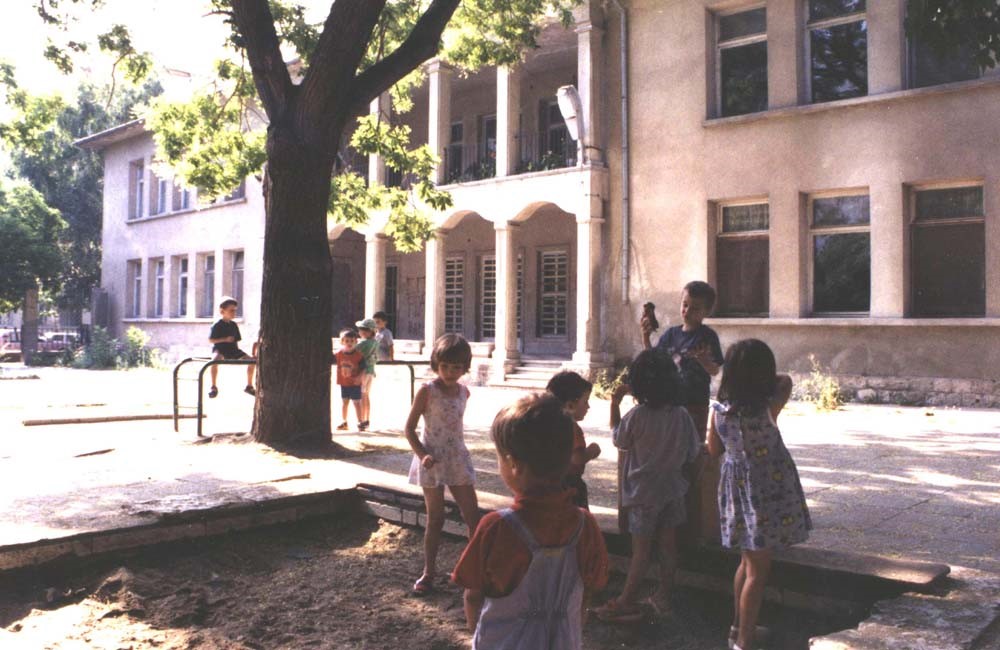
2016
Melissa Kil ~ Melissa originally received support for a project to volunteer on the Island of Lesvos in Greece to provide support for incoming refugees from Syria, Afghanistan, and Iraq. Subsequently to receiving the award, circumstances forced a revision of the project to providing support for refugee camps at Calais and Dunkirk; however a lack of affordable accommodation due to a surfeit of volunteers necessitated a second change in plans to a project supporting refugees in El Cajon, CA.
“I was filled with excitement from the moment I began writing my plan for the Yarrow Award to travel to Greece and volunteer with an NGO to help Syrian refugees. After my project was approved however, the European Union signed a deal with Turkey to send all refugees back to Turkey from Greece, making me unable to fulfill my original project. While there were many setbacks along the way, I ultimately changed my plan and fulfilled by goal of helping refugees by collecting and donating goods to refugee families relocated in El Cajon, CA. I helped organize Arabic speakers, collected clothes and toys for refugee families and drove down to El Cajon multiple times throughout the holiday season to help distribute the donated goods to refugee families in need. While this was not my original plan, I was fulfilled by my Yarrow Award experience and was able to contribute to the cause I originally set out to help.”
2015
Ibironke Otusile ~ Ibironke received support for an internship to compile data on pollution and to work on water collection and conservation practices in partnership with the Lagos State Environmental Protection Agency in Nigeria. A highlight of her trip was teaching grammar school students about water sanitation and building and installing a water filtration system for the school in Lagos.
“They were so attentive and unbelievably respectful. I have never seen such focus before… The students held on to my every word and followed along although the teachers said the topic was out of the scope of what they were learning. It was so exciting to see hands fly up and hear them answer each question correctly. It was even more exciting to hear their ideas when I asked thought-provoking questions about how we could resolve the issue at hand and how to possibly prevent a future water crisis in Lagos.”
2014
Angela Abiodun, SS05 ~ Angela’s project involved supporting the work of the Paolo Freire Project at the University of KwaZulu-Natal in Pietermaritzburg, South Africa, an experimental institute that puts the pedagogical t
heories of Freire into effect.In particular, she helped to develop a film series, organized data on bullying and conflict, and laid the groundwork for a Trade School program in which individuals from varying backgrounds teach classes about areas in which they have expertise.
“Through working on the foundational work for a Trade School, researching films and videos documenting human movement around the globe, supporting a staff member on compiling data about violence in schools and building engaging relationships, I was able to explore my understanding of Freirean thought and see a part of the world that I otherwise would not be able to engage with. [….] This trip solidified my desire to leave the US for an extended period of time and confirmed that I could do it by myself. It showed me ways to continue to challenge the systems that oppress us and allowed me to reflect on ways for the systems and the challenging of them to not overwhelm or burn me out. I’m incredibly grateful for the experience…”
2013
Abdramane Diabate, DS’12, and Jonathan deBorst. DS’12 ~ Abdramane and Jonathan were the joint recipients of the 2013 Yarrow Award. Their project included supporting the work of the organization, Casa Adobe, in Costa Rica where they tutored public school children. They also planned to work on sustainability projects such as a community garden and a composting toilet.
“The aim of Proyecto Aventura was to enhance the educational experience of kids living in the area of Santa Rosa, Santo Domingo. We organized several activities including trips, art work, and physical labor which we believe benefited the kids more than we could have imagined. All our participants were from disadvantaged social and economic backgrounds with challenging familial problems. . . Most of them had never engaged before in creative activities or physical labor that could contribute positively to their community. We are grateful for the opportunity and look forward to organizing more education projects in Latin America and Africa in the years to come, and will surely use what knowledge we have gained in this time to do so.”
2012
Diana Louis, SS01 ~ Diana’s summer project involved teaching English to students at the Wamato Primary School (with the Help2Kids charity) in Dar es Salaam, Tanzania.
“Upon my arrival to the orphanage, I was met with great excitement. ‘We were waiting for you,’ many of the other volunteers said after greeting me … ‘because you are a real teacher.’… I realized that I could have a longer‐lasting impact on the children’s education if I designed a program to better prepare the volunteers to teach them. I met with the director and designed a volunteer training program for Wamato school teachers from scratch for which I would make a handbook. … Through the volunteer training program and handbook, my work at the school will go on. … I believe the work has been, and will be, true to the spirit of Mike Yarrow and his commitment to service and social justice.”
2011
Elan Jones, CB09 ~ Elan spent her summer in Madrid, Spain and the Canary Islands working with African migrant advocacy groups to provide help accessing housing, finding employment and providing legal advice.
“We’re learning, we’re laughing we’re sharing, all of us strangers…This adventure has caused me to question what I’m doing with my life. The change I’m hoping to inspire won’t come out of a questionnaire or an equation; it comes from connecting people to one another…going out and experiencing the world and the people in it. I’m incredibly thankful that the Yarrow scholarship gave me the opportunity to do just that.”
2010
Seth Galligan, MB08 ~ used the award to fund a video production program at the Children’s Project Trust (CPT), a school and home for destitute children in Karnataka, India.
” My original intention was to return to the Children’s Project Trust (CPT), a home and school for destitute children in India, install a video production curriculum and begin production of a short promotional video. Not only was I able to achieve these things, but I was also able to construct a computer lab with internet connectivity for the school.
During my time with my students, I was able to spark a keen interest in video production and complete eight short videos with them (www.vimeo.com/album/1073313). I also managed to train two staff members well enough that I am confident that they will be able to continue offering video production as an enrichment course.
Many of the children at CPT have loving parents who just have nothing to offer their children in the way of basic needs. I went with a few children from the school to a tent village where some of these parents live in small makeshift shelters. I was deeply touched by the love and dignity that was present even in the most ghastly of circumstances.
If I had to boil down this experience to one word it would be: validating. I am graduating in December and moving on to graduate school with the intention of becoming a community college teacher after that. This impending transition from student to teacher can be intimidating. While I was in India, I gained confidence in my ability to do what I am now setting out to do. I can tackle tough issues by myself and get through them, even in a foreign country. My belief in myself was validated.
I am very thankful to have had this opportunity. Not only was it a wonderful learning experience and a great chance to help people I care about, but it has also demonstrates the abilities I have developed while a student at the University of Michigan. “
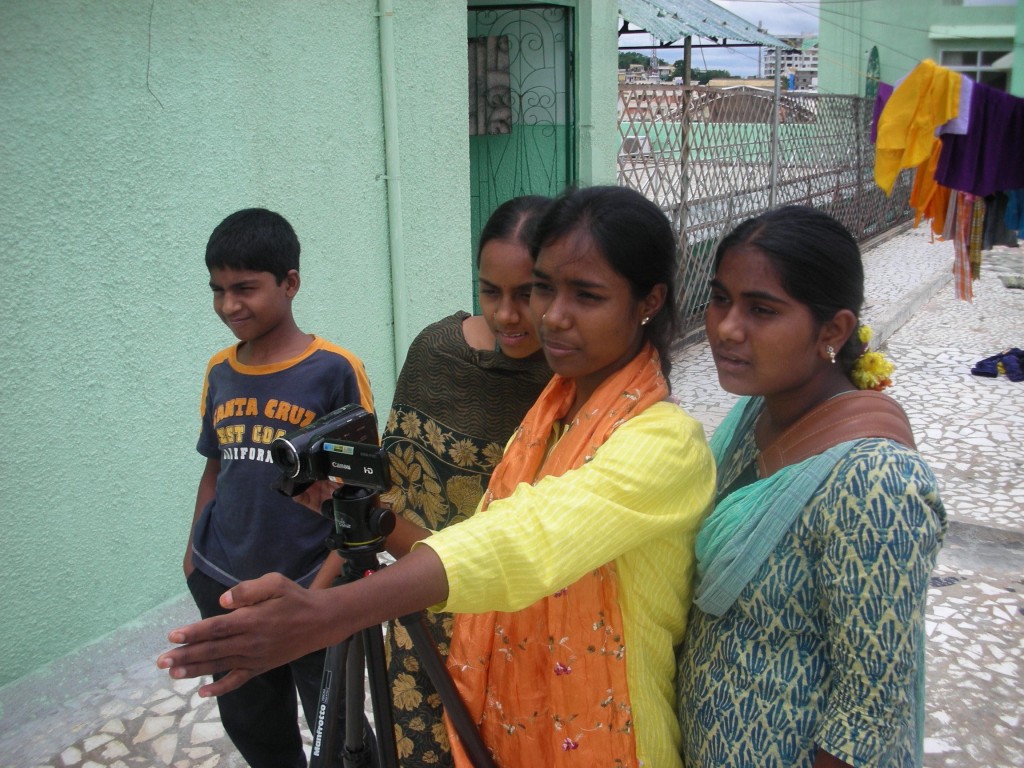 Students filming in Karnataka, India
Students filming in Karnataka, India
2009
Flojaune Griffin, MB05 ~ spent the summer of 2009 working on two projects in South Africa. Griffin is a doctoral candidate in Epidemiology at the University of Michigan School of Public Health.
“In conjunction with my host organization, TRG International (TRG), and with the support of Telluride Association’s Yarrow Award, I worked on two projects in South Africa during the summer of 2009: an early childhood education conference in Johannesburg and a college preparation mini-course in Durban.
One moving highlight were the workshops on CPR and First Aid I led at the Early Childhood Education Conference, the first in Soweto history, and for high school students at a leadership conference in Durban. Students told me stories of diabetic emergencies, cardiac arrest, and seizures and some of the misguided steps people in the community took to address them.
In Soweto, I was taken aback by a volunteer who agreed to help me demonstrate how to treat a burn and then began sobbing uncontrollably during the demonstration… She was overwhelmed with emotion because a child in her pre-school had been badly burned. Unfortunately, the injuries were worsened because the teachers were unsure how to attend to them. I realized then that their thirst for knowledge was not an academic pursuit or an enthusiasm for the unknown, but in fact personal; they wanted to know more to be able to better serve and protect their students, friends and families.
This project was academically relevant, but it was also personal. My Yarrow Award Project in South Africa overwhelmed, perplexed and inspired me in a way that I still struggle to describe. My travels have inspired … the drive to want to be of service to others in such a way that my travels benefit my community at home and those abroad. “
2008
Beenish Ahmed, MB07 ~ worked for a literary program for women and children in Pakistan.
“In my proposal, I wrote of my intentions to facilitate creative writing, but very soon found that the basic literacy level of students was not sufficient to work on literary undertakings. I think the construction of one’s own personal narrative is of the utmost importance, especially for groups marginalized by socio-economic conditions. By and large the children of agricultural workers and domestic servants, the students at the Dosti School had exceptionally low literacy rates since their studies were so often interrupted to pursue odd-jobs to support the family. Thus, I worked to bolster their skills in Urdu and English and encourage further study in these fields that are so often sublimated to the presumed practicality of the hard sciences. To facilitate voice by more immediate means, I collected oral histories from students whenever time allowed while also keeping a daily log of what I experienced there. I am now working in collaboration with the Dosti School Administration Board to disseminate my collections and reflections on a website with the hope of raising funds to sustain the thirty-some schools run by the Dosti Foundation.”
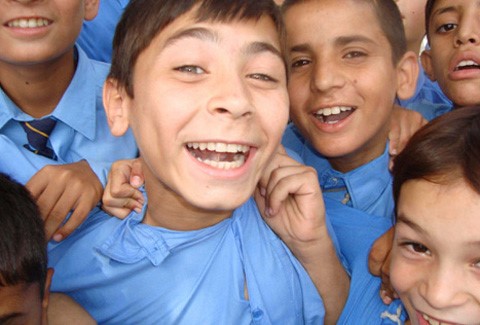 Children of the Dosti School, Pakistan.
Children of the Dosti School, Pakistan.
2007
Alvar Ayala, MB06 ~ interned with a legal clinic for immigrant worker populations in Chicago.
“”The Working Hands Legal Clinic, where I worked this summer, is a new organization whose young roots grow out of the worker centers in Chicago. Worker centers are grass roots organizations that seek to educate an advocate on behalf of low wage workers with the community’s support. Chicago has five of such centers located in different parts of the city. While worker centers work with African American, Polish immigrants, and anybody else in need, Latino immigrants, documented and undocumented alike, constitute the largest percentage of these centers’ membership. Working Hands arose to meet the centers’ need for professional legal expertise and to increase their members’ access to legal representation.”
2006
Eunice Yu, MB04 ~ worked for the Development Bank of Southern Africa on HIV/AIDS prevention and completed an internship with the Program on International Health and Human Rights at the Harvard School of Public Health.
” My own neighborhood, where I lived in a formerly-white suburb with a middle-class black family, had open entrances but enclosed homes. There was no way to ring the doorbell but to shake the gate. The suburb next door had accessible doorbells but walled-in streets. Universities are fortresses, and regular citizens must pay to merely enter their libraries, not to mention borrow books. So while the exclusionary regional planning of apartheid no longer occurs and many blacks have returned to previously white areas, there is an emergent physical separation based on class. Indeed, these barriers turned out to be more obstructive than I realized at the time. In my funding proposal, I imagined I would be able to volunteer with other organizations beyond the bank. I did not realize that the bank is situated an hour from both Johannesburg and Pretoria, in a string of intermediate suburbs and settlements connected by highways. There is no practical public transportation, and I was not old enough to rent a car.”
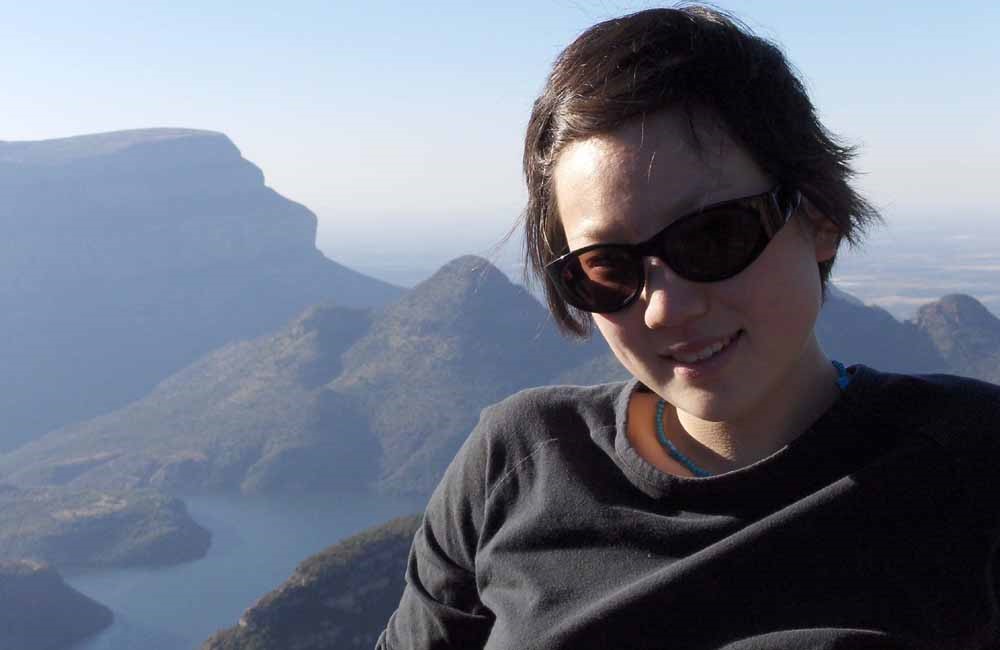 Eunice Yu in South Africa (Mpumalanga Province).
Eunice Yu in South Africa (Mpumalanga Province).
2005
Adey Fettene, SP00 CB01 ~ traveled to Addis Ababa, Ethiopia where she had first-hand experience of the post-election fallout, volunteered at the Mother Teresa Orphanage, and advance her research on LGBT experiences in the Ethiopian Diaspora.
2004
Shawna-Kim Lowey-Ball, SP00 CB01 TA04 ~ received support for volunteer work (with MercyCorps) and had the opportunity to observe elections in Indonesia.
“With the new (and ultimately quite successful) presidential elections looming, the university recruited me to get involved with observations and voter exit-interviews. This task completely won me over. As I talked to voters on Java (and later in Sulawesi), surveyed the press, watched the presidential debate, saw the fishing boats with party flags waving, and watched students protest against any presidential candidate who had formerly been a member of the Indonesian military, it became obvious that things were going to go off well. The country was engaged, and I was too.”
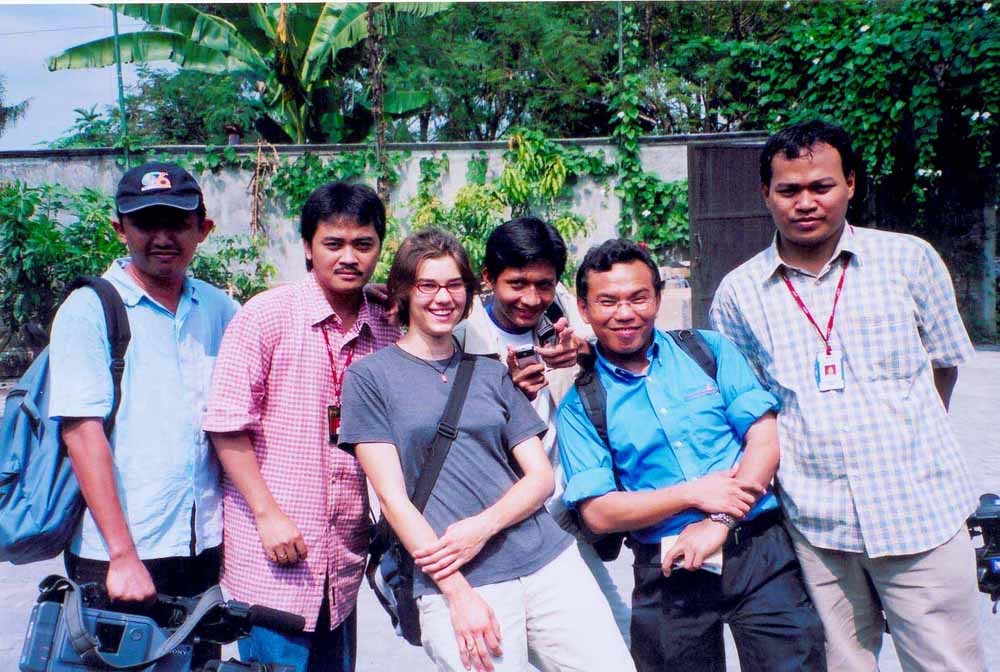 Shawna-Kim Lowey-Ball, in Indonesia, pictured here with the crew of Channel 6 News outside the home of presidential candidate Amien Rais during the summer of 2004.
Shawna-Kim Lowey-Ball, in Indonesia, pictured here with the crew of Channel 6 News outside the home of presidential candidate Amien Rais during the summer of 2004.
2003
Henrique Suguri, SP99 CB00 TA01 ~ produced a film documentary exploring the gay community in Sao Paulo, Brazil.
2002
Aoife Naughton, CB00 ~ facilitated an environmental theater workshop for Belfast’s inner-city teens.
Theron Tingstad, MB01 ~ documented the activities of the Guadalupe Foundation in Honduras through film, photography, and drawing.
“While I was in Honduras, I met some of the most hospitable people in the world. Despite their obvious poverty they took me into their homes and for the better part of three months I was a part of their lives. I learned and taught sustainable agriculture methods, followed a doctor as he made his rounds through nearly inaccessible mountain villages, and I climbed Honduras’ second highest mountain peak, staying the night atop the mountain beneath a 100 foot rainforest canopy. I practiced all summer to be part of my town’s rodeo team, and competed in an regional rodeo. I only made it through two rounds of the rodeo, succumbing to an injury, but my town went on to win the rodeo. A few nights later, at my going away party, my team-mates gave me a little keepsake, an unremarkable wooden statue. Later in the night I was overwhelmed to realize that they had given me the 1st place team trophy, to take back with me to the United States. Without the Mike Yarrow award my project in Honduras would have been difficult if not impossible. I highly recommend using it for a project in a developing country, where you can leverage the American dollar to get maximum support for your project.”
 Photo taken by Theron Tingstad in Honduras
Photo taken by Theron Tingstad in Honduras
2001
Jennifer “Vern” Long, CB99 TA02 ~ was granted funds for her project helping young women further their education in Zimbabwe.
“Given the serious economic recession in Zimbabwe and the contraction of the economy, it was difficult to identify girls who could take the time to study – as their families often preferred that they work. Further complications included transportation problems and identifying a study area for the girls in the evenings. Zimbabwe’s government rationed fuel for many months so public transportation was often non-existent and kerosene was also difficult to get. These girls couldn’t afford adequate amounts of kerosene for their lamps at night – so after a full day of working, and since it was dark by 7PM, they didn’t have light by which to study.”
Sarah Uhler Morton, MB00 TA01 ~ was awarded funds to study the correlation between maternal mortality and child morbidity/mortality in Haiti.
“Beyond the knowledge that I gained regarding public health methodologies and statistical techniques, I feel that my true education this summer came from traveling and living in a country so very different from my own. My experience with French allowed me to communicate with most of the people I encountered, and the bit of Creole that I learned helped when traveling in the rural villages. Thinking back, I can close my eyes and be standing on the bumpy dirt road that lead into town, and I feel the terrain around me. The situations that I encountered cannot be equated with anything that I ever expect to experience again. On my first day in Jeremie, we traveled to a village that was a two hour hike through the forest. When we reached the last stream that we needed to cross, there were two-score of women from the village waiting on the other bank, singing songs to greet us. The Mother’s Group of the villages had written the songs, and the lyrics enumerated the benefits of breast milk and eggs. Once in the village I helped the HHF staff in conducting prenatal visits, tuberculosis and pneumonia screening, and polio vaccinations. During the screenings for tuberculosis, two small children succumbed to their respiratory ailments. Then, out of the blue, a woman in labor arrived at the village, and the visiting doctor delivered her baby with no medical supplies other than a pair of scissors that we had held over a flame to disinfect. I have to say that my first day was quite an introduction to field medical care, and was a good measure of the intensity of the rest of my experiences.
2000
Seth Yalcin, MB99 ~ received support for a service project aimed at improving the educational opportunities in rural Nepal.
1999
Stanka Fitneva, CB98 TA01 ~ was granted funds for a project exploring psychological aspects of child development and primary education in Bulgaria.
“The Mike Yarrow award allowed me to work on a project I have been contemplating for a couple of years. The motivation I had was to develop my professional connections with the Bulgarian day-care centers and schools I work with. . . The work on the project required me to acquire a lot of knowledge, e.g., about the methodologies used to study children . . . It also made me engage intellectually with some social and political issues that people living in Bulgaria face and forced on me the realization of how separated from my native country I am.”
